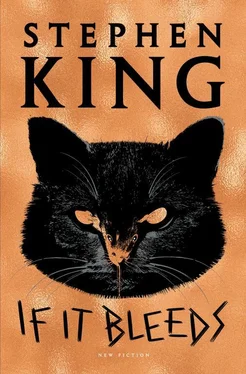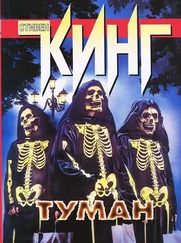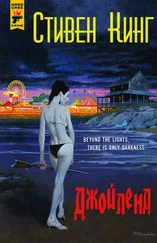“Brad—”
“Brad knows everything,” Dan says, waving that driftwood hand dismissively. “A good boy, gay or not.” Holly has time to muse that when you’re in your nineties, even men twenty years older than Brad Bell must seem like boys. “A smart boy, too. And you don’t have to tell me your story if you don’t want to—although I would love for you to fill in certain details I’m curious about—but before I tell you what I know, I must insist that you tell me what caused you to suspect Ondowsky in the first place.”
This is a reasonable request, and she runs down her reasoning… such as it is. “Mostly it was that little spot of hair beside his mouth that kept bugging me,” she finishes. “It was as if he put on a false mustache and was in such a hurry when he peeled it off that he didn’t get all of it. Only if he could change his whole physical appearance, why would he even need a false mustache?”
Bell waves his hand dismissively. “Did your outsider have facial hair?”
Holly thinks, frowning. The first person the outsider impersonated (that she knew of), an orderly named Heath Holmes, didn’t. The second one didn’t have face hair, either. His third target had a goatee, but when Holly and Ralph confronted the outsider in the Texas cave, his transformation hadn’t been complete.
“I don’t think so. What are you saying?”
“I don’t think they can grow facial hair,” Dan Bell says. “I think if you saw your outsider naked—I assume you never did?”
“No,” Holly says, and because she can’t help it: “Oough.”
That makes Dan smile. “If you had, I think you would have seen no pubic hair. And clean armpits.”
“The thing we met in that cave had hair on his head. So does Ondowsky. So did George.”
“George?”
“What I call the man who delivered the package with the bomb in it to the Macready School.”
“George. Ah, I see.” Dan appears to meditate on this for a moment. A little smile touches the corners of his mouth. Then it fades. “Head hair is different, though, isn’t it? Children have hair on their heads before puberty. Some are born with hair on their heads.”
Holly sees his point, and hopes it really is a point and not just another facet of this old man’s delusion.
“There are other things the bomber—George, if you like—can’t change the way he changes his physical appearance,” Dan says. “He needed to put on a fake uniform and wear fake glasses. He needed a fake truck and a fake package reader. And he needed a fake mustache.”
“Ondowsky may also have fake eyebrows,” Brad says, coming in with a tray. On it are two mugs of tea and a pile of turnovers. “But probably not. I’ve studied pictures of him until my eyes are practically rolling down my cheeks. I think he may have had implants to normalize what would otherwise have just been fuzz. The way baby eyebrows are just fuzz.” He bends to put the tray on the coffee table.
“No, no, your workroom,” Dan says. “Time to get this show on the road. Ms. Gibney—Holly—will you push me? I’m rather tired.”
“Of course.”
They pass a formal dining room and a cavernous kitchen. At the end of the hall is a stair-chair, which runs up to the second floor on a steel rail. Holly hopes it’s more reliable than the elevator in the Frederick Building.
“Brad had this put in when I lost the use of my legs,” Dan says. Brad hands Holly the tray and transfers the old man to the stair-chair with the ease of long practice. Dan pushes a button and begins to rise. Brad takes the tray back and he and Holly walk along beside the chair, which is slow but sure.
“This is a very nice house,” Holly says. Must have been expensive is the unspoken corollary.
Dan, nevertheless, reads her mind. “Grandfather. Pulp and paper mills.”
The penny drops for Holly. The supply closet at Finders Keepers is stacked with Bell copier paper. Dan sees her face and smiles.
“Yes, that’s right, Bell Paper Products, now part of an overseas conglomerate that kept the name. Until the nineteen-twenties, my grandfather owned mills all over western Maine—Lewiston, Lisbon Falls, Jay, Mechanic Falls. All shuttered now, or turned into shopping malls. He lost most of his fortune in the Crash of ’29 and the Depression. That was the year I was born. No life of Riley for my father or me, we had to work for our beer and skittles. But we managed to keep the house.”
On the second floor, Brad transfers Dan to another wheelchair and hooks him up to another bottle of oxygen. This floor seems to consist of one large room where the December sunlight has been forbidden to enter. The windows have been covered with blackout curtains. There are four computers on two work desks, several gaming consoles that look state-of-the-art to Holly, a ton of audio equipment, and a gigantic flatscreen TV. Several speakers have been mounted on the walls. Two more flank the TV on either side.
“Put the tray down, Brad, before you spill everything.”
The table Dan indicates with one of his arthritic hands is covered with computing magazines (several of them copies of SoundPhile , which Holly has never heard of), flash drives, external hard drives, and cables. Holly starts trying to clear a place.
“Oh, just put all that rickrack on the floor,” Dan says.
She looks at Brad, who nods apologetically. “I’m a little messy,” he says.
When the tray is safely in place, Brad puts pastries on three plates. They look delicious, but Holly no longer knows if she’s hungry or not. She’s starting to feel like Alice at the Mad Hatter’s teaparty. Dan Bell takes a sip from his cup, smacks his lips, then grimaces and places a hand on the left side of his shirt. Brad is at his side immediately.
“Do you have your pills, Grampa?”
“Yes, yes,” Dan says, and pats the side pocket of his wheelchair. “I’m all right, you can stop hovering . It’s just the excitement of having someone in the house. Someone who knows . It’s probably good for me.”
“Not so sure about that, Grampa,” Brad says. “Maybe you better take a pill.”
“I’m fine, I said.”
“Mr. Bell—” Holly begins.
“Dan,” the old man says, once more wagging his finger, which is grotesquely bent with arthritis but still admonitory. “I’m Dan, he’s Brad, you’re Holly. We’re all friends here.” He laughs again. This time it sounds out of breath.
“You have to slow down,” Brad says. “Unless you want another trip to the hospital, that is.”
“Yes, Mother,” Dan says. He cups a hand over his beak of a nose and takes several deep breaths of oxygen. “Now give me one of those turnovers. And we need napkins.”
But there are no napkins. “I’ll get some paper towels from the bathroom,” Brad says, and off he goes.
Dan turns to Holly. “Terribly forgetful. Terribly . Where was I? Does it even matter?”
Does any of this? Holly wonders.
“I was telling you that my father and I had to work for a living. Did you see the pictures downstairs?”
“Yes,” Holly says. “Yours, I assume.”
“Yes, yes, all mine.” He holds up his twisted hands. “Before this happened to me.”
“They’re very good,” Holly says.
“Not so bad,” he says, “although the ones in the hall aren’t the best. Those were for work. Brad put them up. Insisted. I also did some paperback covers back in the fifties and sixties, for publishers like Gold Medal and Monarch. They were much better. Crime, mostly—half-dressed babes with smoking automatics. They brought in a little extra. Ironic, when you think about my full-time job. I was with the Portland PD. Retired at sixty-eight. Did my forty and four more.”
Читать дальше








